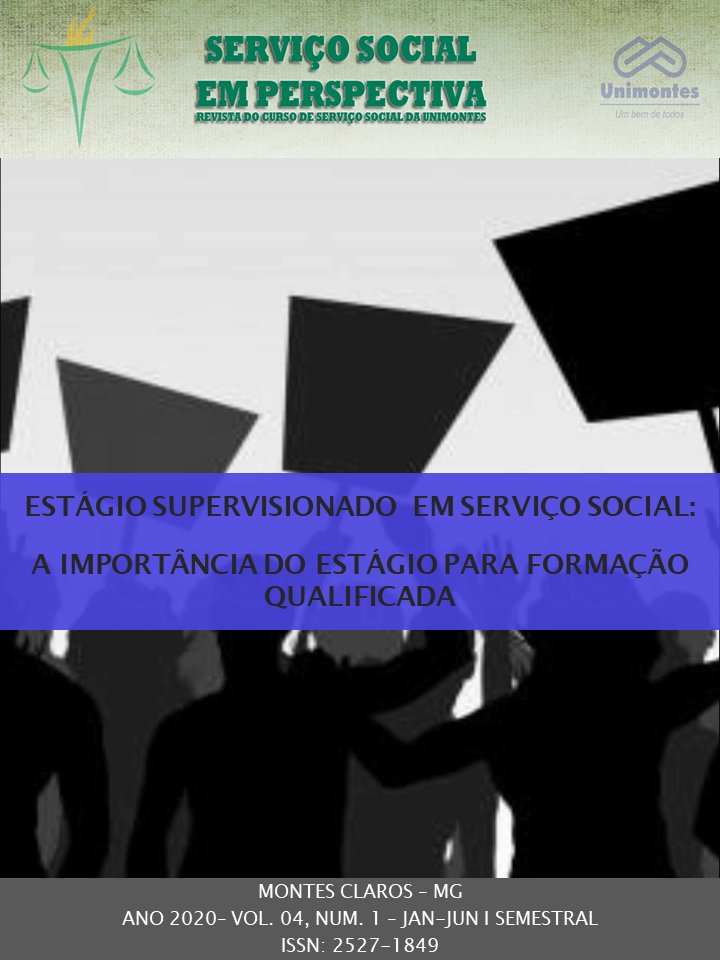O ESTÁGIO SUPERVISIONADO EM SERVIÇO SOCIAL
LIMITES E DESAFIOS PARA A FORMAÇÃO PROFISSIONAL
DOI:
10.46551/rssp.202003Keywords:
Supervised Internship. Social Work. Neoliberalism. Professional Qualification.Abstract
The main objective of this article is to analyze the supervised internship as a mandatory curricular component to complete the undergraduate degree in Social Work, thus constituting one of the great challenges of the professional training project. As is known, this stage of training, when properly carried out, provides students with access to teaching and learning of the social reality in which social workers are inserted. It should be noted that the mandatory curricular internship develops in conjunction with educational policy, in a context in which education has been treated as a commodity, such as the growth of light and distance courses, with various repercussions, among them the exponential increase in number of students looking for an internship and unable to be absorbed in the available socio-occupational spaces. The methodology adopted for the elaboration of this text favored essentially a bibliographic research on the theme, using, therefore, fundamental references in this discussion. Regarding the results of the research, it is concluded that, unfortunately, the internship has been increasingly used by capital as a privileged way of exploiting labor and obtaining profits.
Downloads
References
______. Associação Brasileira de Ensino e Pesquisa em Serviço Social. Revista Temporalis. Brasília (DF), ABEPSS, nº 03, 2001.
______. Associação Brasileira de Ensino e Pesquisa em Serviço Social. Revista Temporalis. São Luís (MA), ABEPSS, nº 14, 2007.
______. Associação Brasileira de Ensino e Pesquisa em Serviço Social. Revista Temporalis. Brasília (DF), ABEPSS, nº 17, 2009.
ANTUNES, Ricardo. A desertificação neoliberal no Brasil (Collor, FHC e Lula). 2ª ed. Campinas: Autores Associados, 2005. 172p.
CARNEIRO, Maria Lúcia Fattorelli. Auditoria da Dívida Externa: Questão de Soberania. Editora Contraponto, Rio de Janeiro, 2003.
BARROCO, Maria Lúcia. Ética e Serviço Social: fundamentos ontológicos. São Paul: Cortez, 2001.
_____. Barbárie e Neoconservadorismo: os desafios do projeto ético-político. In: Revista Serviço Social & Sociedade. 106. Abril/Junho de 2011. Educação, Trabalho e Sociabilidade.
BEHRING, Elaine Rossetti. Brasil em Contrarreforma: desestruturação do Estado e perda de direitos. São Paulo: Cortez, 2003.
BEHRING, Elaine Rossetti & Boschetti, Ivanete. Política social: fundamentos e história. 9ª ed. São Paulo: Cortez, 2011.
CHAUI, Marilena. A universidade pública sob nova perspectiva. Revista Brasileira de Educação. Set /Out /Nov /Dez 2003, nº 24.
DAHMER, Larissa. Mercantilização do ensino superior, educação à distância e Serviço Social. Rev. Katál. Florianópolis v. 12 n. 2 p. 268-277 jul./dez. 2009.
FATTORELLI, Maria Lúcia; Gastos com a dívida pública em 2014 superaram 45% do orçamento federal executado. 5 fev. 2015. Disponível em: http://www.aepet.org.br/noticias/preview/12450/Gastos-com-a-Dvida-Pblica-em-2014-superaram-45-do-Oramento-Federal-Executado. Acesso em: 04 de maio de 2020.
FORTI, Valéria; GUERRA, Yolanda. “Na prática a teoria é outra?” In: Serviço Social: Temas, Textos e Contextos. Rio de Janeiro: Lumen Juris, 2009.
GRAMSCI, Antonio. Quaderni del carcere. Torino: Einaudi, 1977.
IAMAMOTO, Marilda Villela. Renovação e conservadorismo no Serviço Social. Ensaios Críticos. São Paulo, Cortez, 1992.
______. O Serviço Social na Contemporaneidade: trabalho e formação profissional. 5.ed. São Paulo: Cortez, 2001b.
_______. Questão social no capitalismo. In: Temporalis, Revista da Associação Brasileira e Pesquisa em Serviço Social, ano II, nº 3, 2ª edição, ABEPSS, Grafline, Brasília, 2004.
______. Relações Sociais e Serviço Social no Brasil: esboço de uma interpretação histórico-metodológica. 23ª ed. São Paulo: Cortez, 2008.
MARX, Karl; ENGELS, Friedrich. Manifesto do Partido Comunista, 1848. Porto Alegre: L&PM, 2009.
MOTTA, Ana Elizabete & AMARAL, Angela (Org.) Cenários, Contradições e Pelejas do Serviço Social Brasileiro. São Paulo: Cortez, 2016.
NETTO, José Paulo. “La crítica conservadora a la reconceptualización”. Acción Crítica, Lima. Celats,1981.
_____. Crise do Socialismo e Ofensiva Neoliberal. 2. ed. São Paulo: Cortez, 1995.
_____. “Transformações Societárias e Serviço Social: notas para uma análise prospectiva da profissão no Brasil”. In: Serviço Social e Sociedade nº 50. São Paulo: Cortez, 1996, p. 87-132.
_____. Ditadura e Serviço Social: uma análise do serviço social no Brasil pós-1964 – 12ª – ed. – São Paulo: Cortez, 2008.
ORTIZ, Fátima Grave. A Política Nacional de Estágio e a Supervisão Direta: Avanços e Desafios. Revista Temporalis. Brasília (DF), ano 14, n. 27, p. 203-219, jan./jun. 2014.
RIBEIRO, Eleusa B. O Estágio no Processo de Formação dos Assistentes Sociais. In: Serviço Social: Temas, Textos e Contexto. Rio de Janeiro: Lúmen Júris, 2010.
______. O Estágio no Processo de Formação dos Assistentes Sociais. In: FORTI, V.; GUERRA, Y. Serviço Social: Temas, Textos e Contextos. Rio de Janeiro: Lumen Juris, 2013.
SANTOS, Cláudia Mônica; LEWGOY, Alzira Maria Baptista; ABREU, Maria Helena Elpídio (ORG.). A Supervisão de Estágio em Serviço Social: aprendizados, processos e desafios. Rio de Janeiro: Lumen Juris, 2016.
Downloads
Published
How to Cite
Issue
Section
License
Copyright (c) 2020 Revista Serviço Social em Perspectiva

This work is licensed under a Creative Commons Attribution-NonCommercial 4.0 International License.











